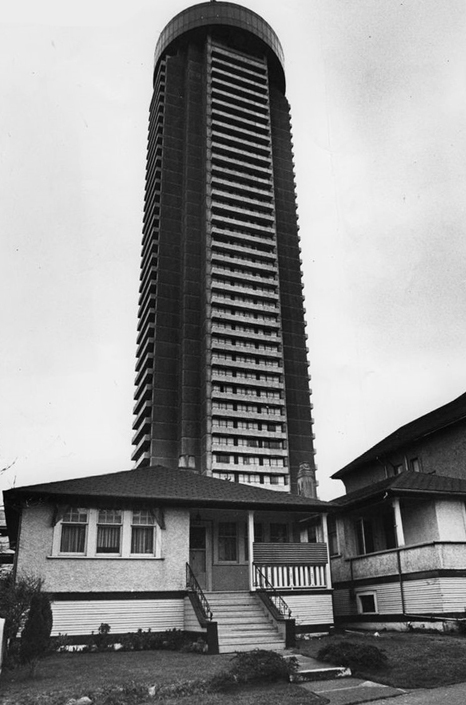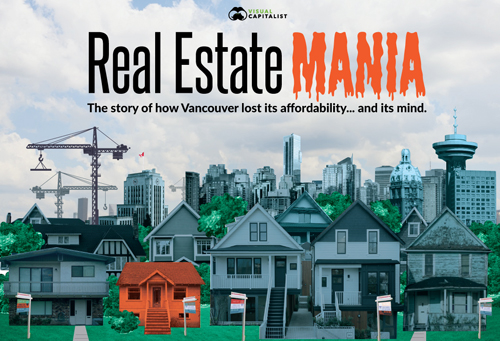
Reflections on Vancouver, British Columbia and other topics, related or not
First they came for
the single-family houses
Skyscrapers face the scrap heap as Vancouver’s
real estate demolition derby continues
Greg Klein | September 25, 2016
A 1974 scene shows the Sheraton Landmark behind an
earlier casualty-in-waiting. (Photo: Dan Scott/Vancouver Sun)
As if Vancouver’s running out of bulldozer bait, skyscrapers built as recently as the ’70s and ’80s might stand next in line for destruction. Hong Kong developers want Robson Street’s 42-storey Empire Landmark Hotel, known as the Sheraton Landmark when it opened in 1973, demolished. In its place they propose two new towers with 223 condos and 57 social housing units, as well as offices and retail, the Vancouver Sun reported on September 24.
“The new frontier for developers is stratas and 1970s buildings,” architect/heritage advocate Don Luxton told the paper. “They’re buying them up all over the place and looking to tear them down, because they’re often underbuilt for their zoning potential.”
He’s not impressed with the foreign ownership tax. “At those prices, pffff, a 15-percent tax is nothing. It’s lunch money.”
The tax looks like another example of politicians trying to subdue voters’ anger by merely tinkering with a policy the government wants to preserve. Anyway, the definition of “foreign” remains narrow, given that Canada freely hands out refugee and immigration status, not to mention citizenship. It takes just three years to be branded “Canadian.” During that time there’s no requirement to live here, no problem with most criminal convictions and no need to learn English or French—hence all the translators on duty at Vancouver polling stations.
In another Sun story, a developers’ spokesperson said condos continue to sell at record levels, with foreign buyers “looking at a 30-month or two- to three-year close, hoping that by then they’ll be landed immigrants and they won’t have to pay the tax.”
That report, an example of very un-Sun-like incisiveness by Joanne Lee-Young, makes Swiss cheese of the province’s claim that foreign purchases plunged after the tax took effect August 2. The Sun and other media had unquestioningly repeated the government’s self-serving claim.
The contention, of course, contradicted the BC Liberals’ earlier argument that foreigners accounted for only three percent of real estate purchases.
Lee-Young quotes a number of people and points out that the government’s most recent real estate data covered Metro Vancouver and Victoria only, showing a slight increase in the latter city’s sales. We’re not told what’s going on in the rest of British Columbia.
Additionally, China’s own real estate and stock market have been improving, the government is cracking down on money moving overseas, and Chinese investors might be starting to worry about Vancouver’s real estate market and the Canadian dollar, according to Lee-Young’s sources.
With an election campaign looming, this issue has the government floundering. Powerful and possibly Liberal-friendly interests want the real estate rush to continue. The NDP has been making noises on behalf of middle class would-be homeowners.
Should a municipal election be held, the issue would play out differently. Vision Vancouver has built an unprecedented coalition of the “left” (in this case, a flaky social engineering movement) and big-time developers/realtors/speculators, not to mention poverty pimps whose power increases with each new development’s social housing quota. Gregor Robertson’s talk of a possible municipal tax on empty houses sounds as disingenuous as the provincial tax.
Those of the Non-Partisan Association persuasion, once the political face of real estate hustlers, remain as directionless as they are gutless.
But an interesting coalition has come together under Justin Fung’s leadership. Housing Action for Local Taxpayers held its first rally earlier this month, drawing dozens of participants according to CTV, or about 200 according to CBC. While some speakers addressed the issue of affordable housing, others took different perspectives. Caroline Adderson, author of Vancouver Vanishes (not to be confused with Michael Kluckner’s 1990 work Vanishing Vancouver) took up the cause of heritage preservation. A principle not often appreciated in Vancouver, previous generations of buildings can offer living monuments to the past and a sense of continuity with the present. That’s especially important to young people growing up in a city that looks like it was born yesterday.
Another speaker was a lawyer who specializes in money-laundering. Christine Duhaime sees Vancouver real estate as an attractive target for ill-gotten gains from China. That could indicate a strong criminal presence among Vancouver’s rich foreign elite. Depending on the extent of such a presence, that might eventually bring wide-open corruption to political parties that now mostly satisfy themselves with ethical corruption.
Fung has previously appeared on CBC with Fenella Sung to criticize those who play the race card in defence of foreign ownership—“and it’s not the Chinese folks that are saying it,” Fung maintained.
Maybe it is, like everything else, all whitey’s fault. But the media will enthusiastically support pretty well any accusations of racism, even when used to support powerful interests. That’s just another example of how political correctness remains the last refuge of a scumbag.

